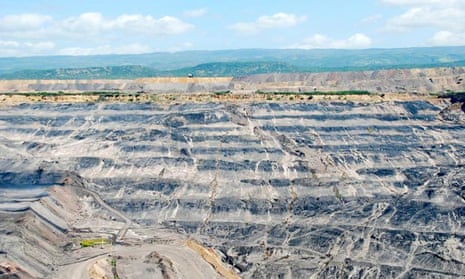The fast-growing campaign to persuade investors to dump fossil fuel stocks has set its sights on a twin target of the world’s biggest mining company and one of the globe’s best universities.
The mining giant BHP Billiton will face protests at its AGM in London on Thursday over its £6m association with University College London (UCL) and the effects of its activities around the world.
The fossil fuel divestment campaign began in the US, where cities, churches and universities have shed their stocks, and has spread rapidly to 50 universities in the UK, with Glasgow the first breakthrough. This week has seen protests against UK banks, which have provided £66bn of funding for fossil fuel extraction.
“UCL is doubly implicated in the devastation that BHP Billiton in causing in countries like Indonesia and Colombia, both through its investments, and through its funding of UCL’s Institute for Sustainable Resources,” said Pekka Piirainen from the Fossil Free UCL campaign.
“Glasgow University has shown great leadership in being the first university [in Europe] to choose to stop profiting from the destruction of the climate – there’s no reason why UCL can’t do the same.”
UCL’s acceptance of funding from BHP Billiton led to the resignation of vice-dean Professor Jane Rendell in 2013.
A leading environmental scientist at UCL, Simon Lewis, said: “When I heard BHP Billiton is the founding funder of UCL’s Institute for Sustainable Resources, I didn’t believe it. It sounds like the environmental equivalent of a tobacco company sponsoring an Institute for Cancer Research. BHP Billiton mines enormous quantities of coal, a fossil fuel that needs to be phased out if international agreements to limit climate change are to be adhered to.”
A spokeswoman for UCL said: “UCL is committed to an investment policy that is guided by ethical considerations. We are currently engaged with the Fossil Free UCL campaign, who have asked us to consider a number of investments, and this is process is ongoing.”
She said: “The funding [from BHP Billiton] are used entirely at the discretion of UCL’s Institute for Sustainable Resources and are not influenced by or a reflection of the company’s business practice.”
The BHP Billiton AGM will also hear protests from people affected by its operations around the world. Rogelio Ustate Arregocés, has travelled from Colombia, where his village Tabaco was destroyed by the opencast Cerrejón coal mine, one of the largest in the world and part-owned by BHP.
“Where Tabaco stood is a hole, a sterile place of sadness and fear,” said Arregocés, who is being hosted by the World Development Movement. He accused BHP of breaking promises made about relocation, compensation and employment and will demand the provision of new land so the hundreds of families displaced can return to farming and fishing. “We want freedom, in our own territory.”
“I want to tell all investors in BHP to withdraw their money because of the damage this multinational does,” Arregocés said. Pius Ginting, from Friends of the Earth Indonesia, will also use proxy shares to tell the BHP Billiton AGM that the company should give up its huge areas of coal mining permits in the rainforests in the heart of Borneo. UCL declined to meet Arregocés or Ginting.
A spokesman for BHP Billiton said: “Cerrejón continues to engage with all the local communities to understand their individual concerns and develop tailored solutions to meet their needs whenever possible. There are a variety of challenges some of which pre-date our involvement.”
On the company’s project in Borneo, called IndoMet, the spokesman said: “Any development by us is subject to detailed environmental and social impact assessments and feasibility studies, including ensuring all appropriate permits are in place. All mined areas will be rehabilitated post-mining.”
The spokesman added that it had no involvement in directing research projects at UCL’s Institute for Sustainable Resources.
Another critical voice at the BHP Billiton AGM will be Ian Dunlop, a long-time former Shell employee and former chair of the Australian Coal Association, who will warn the company that shareholder value is at serious risk because of climate change.
“The opportunity for value destruction is enormous,” said Dunlop, who is seeking election to the BHP board. “BHP are ahead of much of the industry but that is not saying much, as the rest are all in denial.”
“The phase out of coal will be much more rapid than they expect,” he said. “BHP look at it as advanced, incremental change from business as usual, but they have to look at it as a paradigm shift.”
Analysts at Carbon Tracker argue that international action to combat global warming will leave at least two-thirds of known coal, oil and gas unburnable and valueless. The governor of the Bank of England, Mark Carney, said earlier in October the “vast majority of reserves are unburnable.”
BHP Billiton is recommending shareholders vote against Dunlop, stating he lacks the “overall skills and experience profile required”. Dunlop’s attempt to join the board on 2013 was opposed by 96% of shareholders.
“We accept the IPCC assessment of climate change science, which has found that warming of the climate is unequivocal, the human influence is clear and physical impacts are unavoidable,” said the BHP spokesman, citing the company’s recent sustainability report. “Energy coal makes up 25% of the energy mix and in many regions is the source of affordable energy that offers security of supply. This is likely to remain the case for some time.”






Comments (…)
Sign in or create your Guardian account to join the discussion